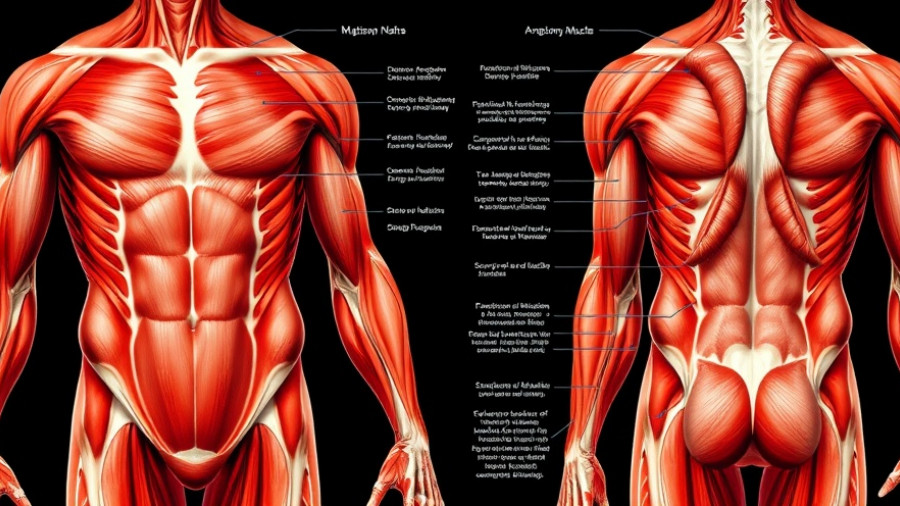
The Hidden Dangers of Muscle Loss After 60
As we age, the decline in muscle mass can often be an alarming reality. For many seniors, losing independence may start quietly, often without them realizing it's happening until it affects their daily lives. Strength deterioration is not a fate sealed by age; instead, it’s frequently due to overlooked nutritional signals from our body. The good news is that science has uncovered specific nutrients that help counter this decline. One such nutrient is leucine—a crucial amino acid that has the potential to activate our muscle-rebuilding capabilities, even in the absence of exercise. In today's exploration of healthy aging, we’ll break down the importance of leucine and practical ways to incorporate it into daily nutrition.
In 'This 1 Ingredient Rebuilds Muscle in Seniors Without Exercise', the discussion dives into the significance of amino acids like leucine for maintaining muscle health in seniors, exploring key insights that sparked deeper analysis on our end.
What Is Leucine and Why Is It Important?
Leucine plays a vital role in muscle protein synthesis, serving as a key signal that prompts your muscles to start rebuilding. However, research shows that after 60, your body’s ability to respond to leucine diminishes, a phenomenon known as anabolic resistance. In younger adults, just a small amount of protein can trigger this response; for seniors, it often requires nearly double that amount to stimulate muscle growth. This increased need can lead many seniors to mistakenly think weakness is simply an inevitable part of aging, but the truth lies in the nutritional signals they might be missing.
Scientific Studies Highlighting Leucine's Impact
A study published in the Journal of Physiology demonstrated how critical leucine can be for elderly men. When added to their meals, leucine supplementation resulted in a remarkable 56% increase in muscle protein synthesis compared to meals lacking this crucial nutrient. Furthermore, research in the American Journal of Clinical Nutrition highlights that older adults require around 78.5 milligrams of leucine per kilogram of body weight per day—more than double the official recommendations.
Understanding the Concept of 'Splanchnic Steel'
Even if seniors consume adequate leucine, nearly half of it can be lost before it ever reaches the muscles, a phenomenon referred to as splanchnic steel. As we age, our digestive systems become less efficient at processing these amino acids, often retaining them instead of transporting them into the bloodstream. For many seniors who eat limited protein, often just during dinner, their muscles miss out on essential nutrients throughout the day. These insights underline the importance of evenly distributing protein intake across all meals rather than banking it all for dinner.
The Power of Protein Timing
It's not just about how much leucine you get; when you consume it matters greatly too. A 2020 study revealed that muscle loss during the night can be significant if your body lacks amino acids during fasting hours. To counter this loss, it’s helpful for seniors to consume a slow-digesting protein source, such as casein, approximately 30 minutes before bed. For example, a cup of cottage cheese or a couple of boiled eggs can sustain muscle preservation overnight, allowing the body to repair and build muscle while you sleep.
Debunking the Protein Overload Myth
A common misconception among seniors is that consuming a large quantity of protein at once, such as a single steak for dinner, is sufficient to meet their muscle-building needs. However, the body lacks a storage system for protein akin to fat reserves; instead, it requires consistent signals of leucine intake throughout the day. Studies suggest that older adults’ muscle protein synthesis significantly improves when they intake around 4 grams of leucine at each meal, emphasizing the importance of meal frequency and balance.
Simple Steps to Reclaiming Muscle Health
For seniors feeling the effects of age on their strength, implementing small nutritional changes can have a profound impact. Strategies such as spreading protein intake evenly, incorporating leucine-rich foods like whey protein shakes or Greek yogurt into meals, and timing protein consumption correctly can facilitate better muscle health. Simple adjustments like adding eggs for breakfast or a protein-rich snack before bed can energize your day and support mobility.
Evidence Shows Potential
The testimonial of Frank, a 72-year-old who revived his love for gardening with the help of a simple whey protein shake, is a prime example of how effective these changes can be. Likewise, Maria’s journey highlights how distributing protein throughout the day led her to feel lighter and more energetic during her evening walks.
Conclusion: Embracing Nutritional Strategies for Healthy Aging
Healthy aging doesn't just rely on exercise; it also necessitates understanding the nutritional needs that can empower us to maintain strength and independence. Leucine serves as a critical messenger in this journey, confirming that our bodies are still eager to respond positively to the right signals, regardless of age. By making thoughtful dietary adjustments such as increasing protein intake and spreading it throughout the day, seniors are not only protecting their muscle health but ultimately their quality of life. As you reflect on your meals, consider which adjustments might serve you well—perhaps you’ll try adding a protein-rich breakfast or a pre-bedtime snack. Whether it's about maintaining your energy for everyday tasks or staying active with loved ones, these small steps can lead to surprisingly significant outcomes.
Engage with your health journey: what changes will you implement this week?
 Add Element
Add Element  Add Row
Add Row 




Write A Comment